Peter Kreeft Philosophy and Apologetics Collection (10 vols.)
Digital Verbum Edition
Overview
In these accessible volumes, philosopher and apologist Peter Kreeft brings his years of research and debate experience to bear on the toughest questions facing Catholics and Christianity. In his clear and concise voice, Kreeft grounds himself in biblical truths as he defends traditional doctrine against societal and philosophical attacks alike. Whether you're searching for answers yourself or guiding someone else into reasonable faith, this collection is good place to start.
With the Logos editions of these texts, you can compile and compare Kreeft’s arguments with other apologists and philosophers with just a few clicks. See all Scripture references on mouseover, and find everything the Bible says about the beginning and end, life and death, and right and wrong in an instant. Logos streamlines your study as you settle your mind and prepare to give a reason for your hope.
Interested in more from Peter Kreeft? Get three collections at a discounted price with the Peter Kreeft Bundle.
Key Features
- Tested arguments on the biggest issues confronting Christianity
- Valuable insight for Catholics and Protestants alike
Individual Titles
- Back to Virtue: Traditional Moral Wisdom for Modern Moral Confusion
- C. S. Lewis for the Third Millennium: Six Essays on The Abolition of Man
- Jacob’s Ladder: Ten Steps to Truth
- Because God is Real: Sixteen Questions, One Answer
- A Refutation of Moral Relativism: Interviews with an Absolutist
- Three Approaches to Abortion: A Thoughtful and Compassionate Guide to Today’s Most Controversial Issue
- Yes or No: Straight Answers to Tough Questions about Christianity
- A Shorter Summa: The Most Essential Philosophical Passages of St. Thomas Aquinas’ Summa Theologica
- A Summa of the Summa: The Essential Philosophical Passages of St. Thomas Aquinas’ Summa Theologica
- Your Questions, God’s Answers
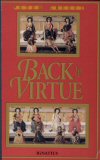
“We have reduced all virtues to one: being nice. And, we measure Jesus by our standard instead of measuring our standard by Him.” For the Christian, explains Peter Kreeft, being virtuous is not a means to the end of pleasure, comfort and happiness. Virtue is a word that means “manly strength.” But how do we know when we are being meek—or just cowardly? When is our anger righteous—and when is it a sin? What is the difference between being virtuous—and merely ethical? Back to Virtue clears up these and countless other questions that beset Christians today. Kreeft summarizes scriptural and theological wisdom on leading a holy life while also contrasting Christian virtue with other ethical systems. He applies traditional moral theology to present-day dilemmas.
Kreeft restores to us what was once common knowledge: the seven deadly sins have an antidote in the Beatitudes. By setting up a close contrast between the two sets of behaviors, Kreeft offers battle-tested guidance in the often bewildering process of discerning right from wrong as we move into the twenty-first century. He provides a road map of virtue, a map for our earthly pilgrimage synthesized from the accumulated wisdom of centuries of Christians, from Paul and the early church fathers to C. S. Lewis.
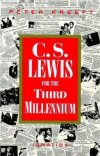
Kreeft, one of the foremost students of Lewis’ thought, distills Lewis’ reflections on the collapse of western civilization and the way to renew it. Few writers have more lucidly grasped the meaning of modern times than Lewis. Kreeft’s reflections on Lewis’ thought provide explorations into the questions of our times, providing light and hope in an age of darkness.
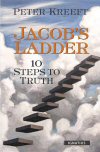
In this volume Kreeft lays out ten important questions he says everyone should ask. He tackles each of these questions in a logical step-by-step way, like climbing the rungs of a ladder. Because questions are best answered by dialogue, Kreeft answers these fundamental questions in an imaginary conversation between two very different people who meet at the beach. Kreeft’s characters begin at the bottom of the ladder: the passion for truth. However, when it comes to the most important questions a person can ask, mere interest in philosophy will not do. The passion for truth does not stop there. It carries the reader from one page to the next in this thought-provoking adventure.
Peter Kreeft is our generation’s C.S. Lewis, as this brilliant new book of his further demonstrates. The genius of Jacob’s Ladder lies in Kreeft’s canny ability to capture the imagination with vivid and arresting prose while simultaneously leading the reader, step by step, above and beyond the cramped limitations of the imagination into the spacious and lofty heights of reason, reality, and truth.
—Patrick Madrid, author, Where is That in the Bible?
In Jacob's Ladder, Peter Kreeft offers a wonderful book for someone genuinely interested in asking profound questions and seeking profound answers. With clarity, wit, and insight, the characters of his dialogue consider some the most central questions in human life-including truth, meaning, love, God and Jesus-in a way both entertaining and accessible.
—Christopher Kaczor, author, Five Pillars of the Spiritual Life
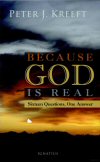
Kreeft sees Atheistic and agnostic writers aggressively attacking traditional religious beliefs. In this work designed for teens and young adults, Kreeft tackles sixteen crucial issues about the deeper meaning of life. He answers questions like: Is faith reasonable? Can you prove there is a God? Why is Jesus different? Why is sex so confusing? Why is there evil? and Why must we die?
Kreeft provides thoughtful, lucid, and persuasive answers for believers, unbelievers, and seekers to consider. This book is ideal for those exploring faith for the first time, as well as for confirmation and religious education classes.
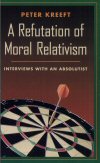
In this volume, Peter Kreeft argues that no idea is more fateful for civilization than moral relativism, and that history knows not one example of a successful society which repudiated moral absolutes. Kreeft claims most attacks on relativism have been either pragmatic (looking at its social consequences) or exhorting (preaching rather than proving), and philosophers’ arguments against it have been specialized, technical, and scholarly. In this fun and accessible volume, Kreeft sets up a dialogue between an absolutist and a relativist that fleshes out the major arguments for both sides, ultimately finding the relativist position to be untenable.
We’ve come to expect nothing less than the most readable and engaging books from the great apologist, Peter Kreeft. He has an uncanny knack to take profound truths and get them across in entertaining and exciting conversation, as he has done here. Once again, Kreeft does not disappoint us.
—Chuck Colson, author, Loving God
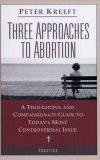
Three Approaches to Abortion: A Thoughtful and Compassionate Guide to Today’s Most Controversial Issue
- Publisher: Ignatius
- Publication Date: 2002
- Pages: 134
Abortion remains a crucial issue in American politics. Three Approaches to Abortion cuts through the rhetoric of today’s politicians. Kreeft argues that it is illogical to support abortion rights while claiming to be personally opposed to abortion. Set up as a dialogue between two people on opposing sides of the issue, Kreeft’s commonsense approach, lucid arguments, and easy-to-grasp illustrations, make this book an invaluable in understanding abortion in 21st-century culture.
What is left to be said about the abortion debate? First of all, that is it usually not much of a debate. Peter Kreeft points the way to taking deepest disagreements seriously in creating and sustaining honest debate.
—Richard J. Neuhaus, editor, First Things
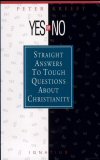
Yes or No: Straight Answers to Tough Questions about Christianity
- Publisher: Ignatius
- Publication Date: 1991
- Pages: 191
In this volume Kreeft tackles many of the tough questions facing Christianity today. In a series of imaginative dialogues, Sal the Seeker and Chris the Christian deal with the profound mysteries of the Gospel. The result is a book that is both engaging and profound. Kreeft shows how Christianity is God’s marriage proposal to the soul, and the answer must be “yes” or “no.” Kreeft explains how we can evade the claims of Jesus Christ for a while, but death brings evasion to an end. It is wiser to look at Christianity honestly now. Yes or No? shows the truth of Jesus’ promise that those who sincerely seek the truth shall find it. It is a road map for those who are honestly seeking the truth and a source of greater faith for those who have already found God. It presents the full challenge of the gospel in a way modern men and women can understand.
Lots of writers have the gift of irony, or humor, or logic, or common sense. Very few combine all these gifts in one talent and put it at the service of truth. Peter Kreeft is simply the best, the most engaging, Christian apologist at work today, and this book is another example of a master craftsman at his peak.
—Fancis X. Maier, editor, National Catholic Register
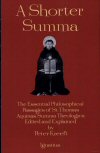
St. Thomas Aquinas is universally recognized as one of the greatest philosophers who ever lived. His writings are both clear and profound; he is a master of metaphysics and technical terminology, yet full of both theoretical and practical wisdom. The Summa Theologica is timeless, but particularly important today because of his synthesis of faith and reason, revelation and philosophy, and the biblical and the classical Greco-Roman heritages. This little book is designed for beginners, either for classroom use or individually. It contains the most famous and influential passages of St. Thomas’ philosophy with copious aids to understanding them.
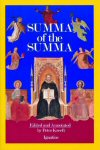
This unique book combines selected essential philosophical passages from Aquinas’ Summa with footnotes and explanations by Peter Kreeft. Kreeft selected those passages from Aquinas that are intrinsically important, non-technical enough to be intelligible to modern readers, and most likely to be used in a class or by an independent reader. Kreeft’s detailed footnotes explain difficult or technical passages and call attention to points of particular significance for the modern reader.
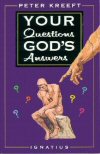
In this book Kreeft provides the Bible’s answer to the most common and important questions young people ask about the deeper meaning of life, their own identity, overcoming failure and temptation, the mystery of God’s love, and much more. Kreeft believes these are important questions for everyone to ask, and that God's answers, as found in the Bible, respond to the deepest needs of every person.
Product Details
- Title: Peter Kreeft Philosophy and Apologetics Collection
- Author: Peter Kreeft
- Publisher: Ignatius
- Volumes: 10
- Pages: 2,106
About the Author
Peter Kreeft is a philosopher, theologian, and apologist. His concise, lucid, wit-infused prose draws frequent comparisons to that of C. S. Lewis. He has written dozens of books on understanding philosophy, defending the Christian faith, and encouraging Catholics on difficult doctrine. He is currently professor of philosophy at Boston College.
Key Features
- Tested arguments on the biggest issues confronting Christianity
- Valuable insight for Catholics and Protestants alike
Product Details
- Title: Peter Kreeft Philosophy and Apologetics Collection
- Author: Peter Kreeft
- Publisher: Ignatius
- Volumes: 10
- Pages: 2,106
About the Author
Peter Kreeft is a philosopher, theologian, and apologist. His concise, lucid, wit-infused prose draws frequent comparisons to that of C. S. Lewis. He has written dozens of books on understanding philosophy, defending the Christian faith, and encouraging Catholics on difficult doctrine. He is currently professor of philosophy at Boston College.